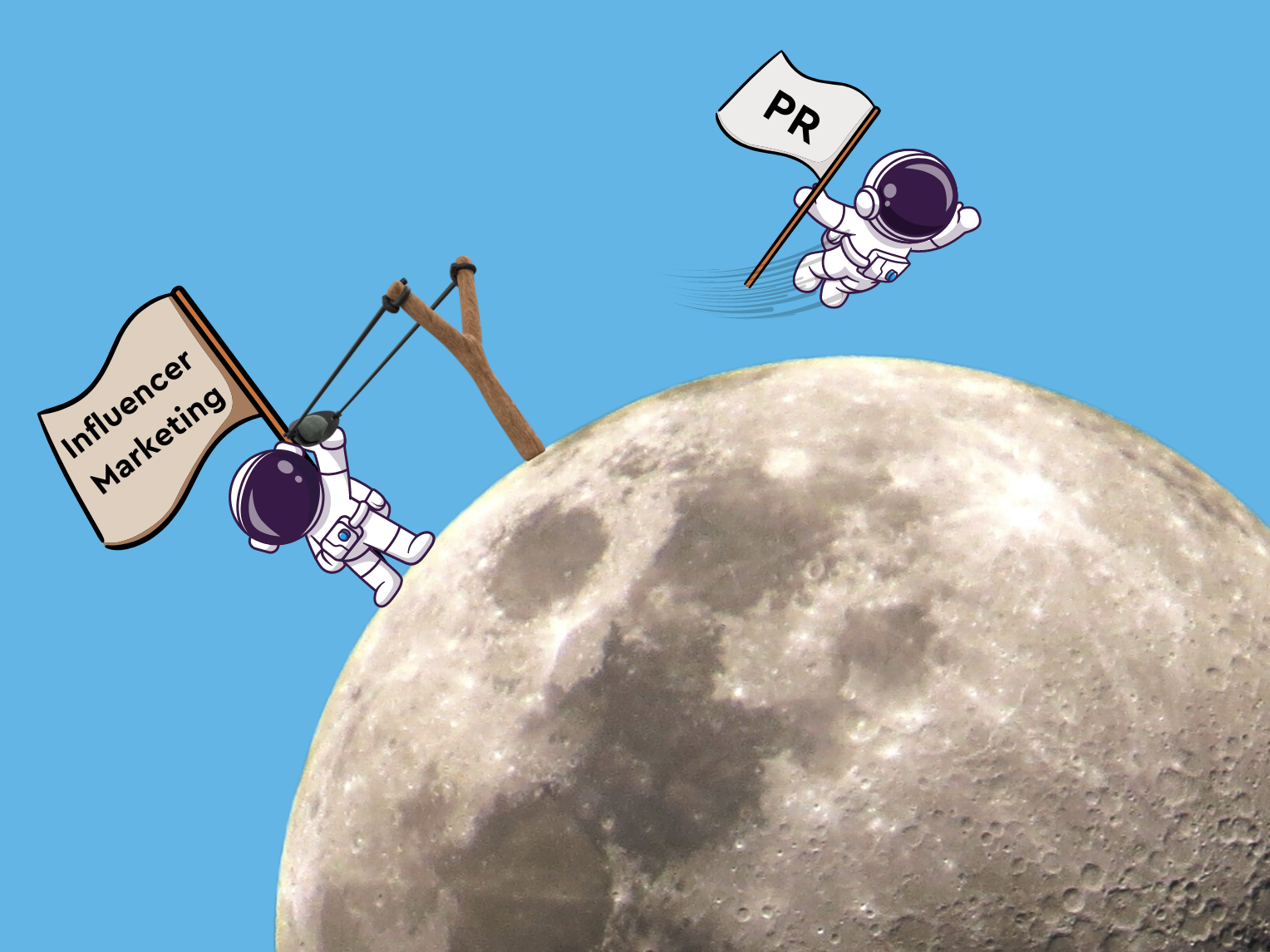Will influencer marketing shoot PR off the moon?
61% of consumers are more likely to trust product or company advice from their loved ones, or influencers on social platforms—this according to a recent study from Matter, a brand elevation agency. It is undeniable that Influencers have become an increasingly influential force in marketing and society over the past decade. As we’re about all things PR and comms, we’d like to take a closer look at the role of influencers in PR. We’d like to address the following questions: Who are they, and what is so important about influencer marketing? How do influencers affect PR? And how does the comms cosmos future look like with influencers in it?
What in space are influencers?
Let us start from the beginning. The term "influencer" refers to individuals who have a large following on social media platforms and are considered experts or authorities in their respective fields. Ideally, they are space travelers who have a clear mission, and stand up for their values. They can create a network of like minded people and can help underrepresented groups feel heard. For example, macro-influencer, Leah Thomas, who has over 240k followers, is committed to sustainability and so on, and represents many people who share a similar commitment. Many influencers try to ensure that many different groups of individuals are represented in online communications such as campaigns, or branded posts. According to Influencer Marketing Hub, a leading social media resource for agencies, brands are shifting their corporate culture toward a brand with the focus on inclusivity. A direct link can be drawn from this and influencers becoming increasingly influential in shaping public opinion and cultural trends.
How will influencers affect PR?
When it comes to reaching audiences and creating positive brand experiences, influencers certainly affect PR. For PR professionals, they could take advantage of the many opportunities for their clients/brands to partner up with influencers that are a great fit for their brand’s vision and needs. It’s a win-win for both, influencers who are true to themselves, and stand on their values, can create content they feel their followers would enjoy while promoting a brand, and getting compensated for it. The brand gets access to an audience that would otherwise have been improbable to reach through traditional advertising. Not to mention, the higher engagement rate and brand visibility—according to Agility, a media monitoring company.
Influencers in comms crises
Now and then, a crisis situation pops up in the comms cosmos. According to software company Sprout Social, influencers are crucial during these moments for recreating positive branding. Since they usually partner up with brands that share their purpose, they facilitate trust between the brand and the influencers’ followers. Hopefully, the influencers are authentic and can garner support for the brand.
Source: Casey Neistat on Twitter
Remember the professional US football player Colin Kaepernick? After repeatedly taking a knee for the national anthem in protest of police brutality, he had received both backlash and support from fans. He was allegedly blackballed by the NFL for his protest. In 2018, Nike and Kaepernick ended up working together in a controversial ad. Nike employed influencer marketing to shift the opinion of people who viewed Nike's partnership with Colin Kaepernick, as unpatriotic and against American values. For example, the well-known Youtuber Casey Neistat, tweeted in support of Nike’s ad—that he appreciates that the brand stands with Kaepernick. His tweet had over 12,000 retweets and 72,000 likes, which might have inspired some of his followers to share his opinion about Nike. This is a small example of how Nike could strengthen its reputation as a brand that stands up for what it believes in, thanks to the help of influencers and their reach.
Most recently there has been much backlash for Anheuser-Busch, regarding their latest campaign featuring trans influencer Dylan Mulvaney promoting Bud Light. Despite the campaign being met with mass controversy, ranging from boycotts to the likes of Kid Rock shooting cans of Bud Light in protest, there has also been an outcry of public support. The vocal support of a wide array of other influencers, has facilitated the growth in support for the campaign, as well as facilitated its exposure to a wider audience. The TikTok hashtag #isupportdylanmulvaney has multiple videos, gathering hundreds of thousands of likes and receiving over 800k total views. Additionally, Mulvaney and Bud Light have both seen significant growth in their Twitter followings in the weeks following the collaboration, with Bud Light gaining 4000 followers in a month and receiving 4.8k likes from a tweet simply captioned ‘TGIF’. With this style of post normally attracting only a few hundred likes, the power which the influencer has on both public support and exposure is evident.
The comms cosmos future with influencers
But, will influencers then become a direct competitor to PR? Simply put, influencers are unlikely to become direct competitors to PR, as both fields of communication rely on each other for success. PR agencies have established relationships with a broad network of media outlets, journalists, brands, and traditional media. Meanwhile, influencer marketing is a separate field that is typically integrated into an overall marketing strategy, according to Influencer Marketing Hub. Both PR and influencer marketing share the same goal of promoting a positive brand image and story, and they can complement each other to achieve this objective. Therefore, the two fields will strengthen each other rather than compete.
So remember that influencers have become a crucial part of the comms cosmos. Providing an opportunity for brands to connect with a wider audience and build trust through authentic partnerships. By focusing on inclusivity, influencers are changing the way we approach marketing and PR. Furthermore, influencers can help recreate positive branding in crisis situations. The future of communication is likely to see influencer marketing and PR as complementary fields that strengthen each other, and together, taking PR and communications to new heights. Are influencers part of your marketing and PR strategy?
Further reading you might also enjoy:


